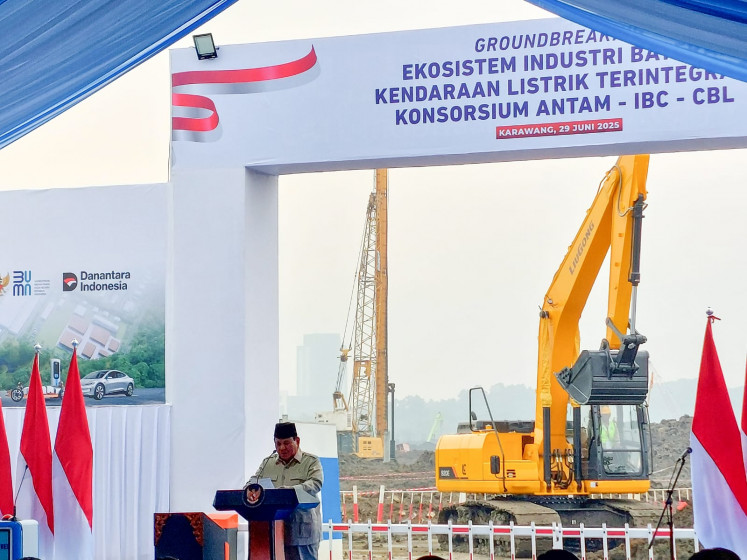Popular Reads
Top Results
Can't find what you're looking for?
View all search resultsPopular Reads
Top Results
Can't find what you're looking for?
View all search resultsThe 'Internet of Things' changing our future
Advances in digital and mobile technologies are driving fundamental changes in customer behavior and expectations
Change text size
Gift Premium Articles
to Anyone

A
dvances in digital and mobile technologies are driving fundamental changes in customer behavior and expectations. Given that Indonesians are so Internet savvy ' Internet user growth has leapfrogged from 2 million in 2000 to more than 76.4 million today. Another interesting phenomenon is that access to the Internet is more from their mobile or at cafés, rather than from home.
With this growth, we can say Indonesians expect more immediate online services.
In response, banks are searching for ways to transform data into insight to better understand their customers ' and use that knowledge to deliver an outstanding customer experience.
The so-called Internet of Things (IoT) will create unparalleled opportunities for Indonesia's financial services firms to deliver finely tailored advice; products and services in near real-time. If you don't know what the IoT is ' in layman's terms it is the notion that an increasing number of physical things can be accessed, represented and controlled through the Internet. Today more than 10 billion devices are connected to the Internet, enabling us to work, share and collaborate more effectively than ever before. During the next 10 years, another 10-20 billion items will be connected, from household appliances to heavy machinery. Each will provide a steady stream of data to enable people to make better, faster decisions.
By harnessing the power of the IoT, banks will evolve into something new and exciting. We call it the Bank of Things.
Consider these scenarios.
Accessing the data captured by smart devices of all kinds will enable the Bank of Things to provide customers with a holistic view of their personal finances, updated in real time. Indonesia's banks will be able to use their data-driven insights to anticipate customer needs ' and offer advice, products and solutions to help customers make smart, financially sound decisions that are not only convenient but maximize their opportunities to save and make money.
Already, auto insurers such as Progressive and Travelers are using telematics devices to monitor customers' actual driving behavior and adjusting their premiums accordingly ' a first step toward a world where accurate, customer-centric pricing is the norm. In the future, we may well see home insurance coverage and premiums regularly adjusted based on usage data streamed from household contents and smart devices.
Indonesian banks need only look to Turkish bank Garanti's mobile app for guidance. It alerts customers about special offers on their favored brands, offers saving suggestions and estimates month-end balances based on spending patterns. This is the start of the next wave of digital.
The successful business banks of the future will be those that help their customers achieve superior results. By accessing data from across their business customers' value chain, from suppliers to distributors to retailers, the Bank of Things will be able to develop much deeper insights into those customers and their business so that together they can optimize how that business operates. While at one level this might involve the assessment of transportation carriers and shipping routes to identify those that result in a higher proportion of damaged or lost goods at the next level this could be linked with the latest sales results so that the inventory values showing on the balance sheet are known in real time (and associated insurance premiums can be adjusted accordingly).
Insights such as these will allow banks to provide financial analysis, products and services that enable their business customers to gain a competitive edge in a highly connected, hyper-competitive market.
Soon, even the most mundane appliance will provide a steady stream of data that can be analyzed and acted upon. To thrive in this coming world and build and retain a sustainable competitive advantage, Indonesia's banks will need to continue to invest in their data gathering and analytics capabilities, and build new partnerships with a wide range of organizations to ensure they can obtain the data. To seamlessly embed them in their customers' daily lives ' and avoid becoming an intrusion ' banks will need to be absolutely precise in the choice of distribution tools, applications and methods used for each customer. Those who embrace these opportunities will stand the best chance of becoming a ubiquitous, central player in their customers' lives.
The writer leads Accenture's financial services distribution, marketing and analytics business across Asia Pacific.









